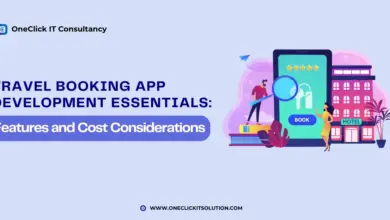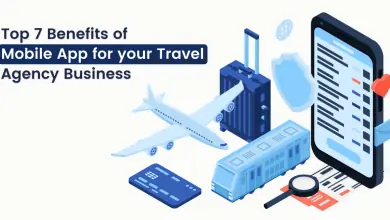How to Create a Mobile App for Your Travel Agency
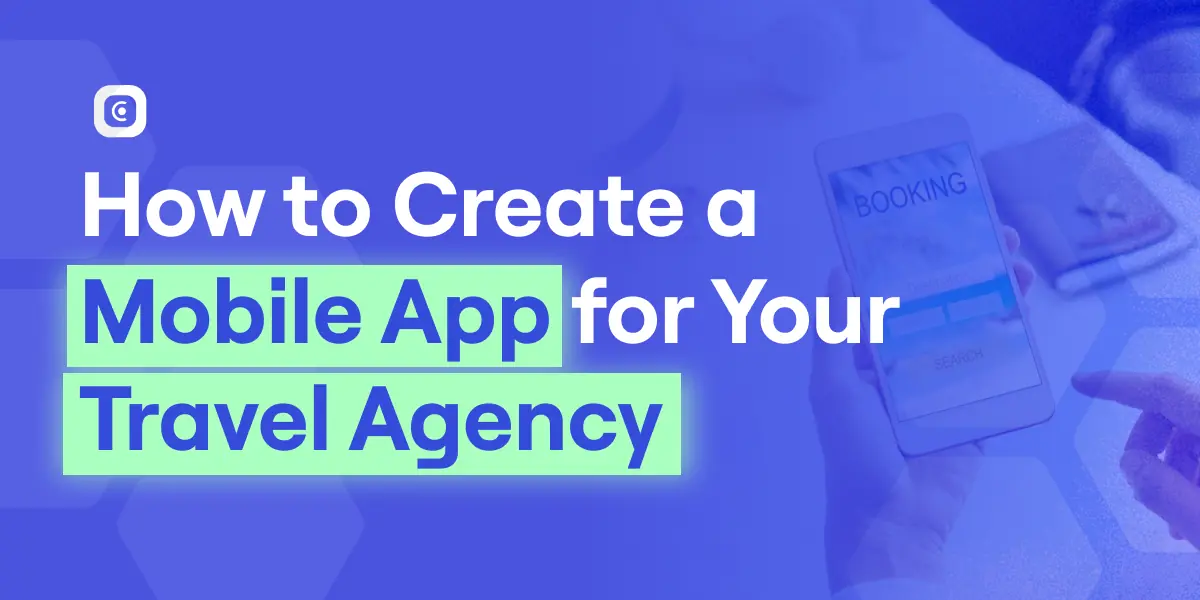
With modern technology, every customer depends on their phone for every big or small need. Whether it’s monthly grocery shopping or booking the next holiday trip, users like doing it their way. The same applies to the travel industry, making it equally important for travel agencies to create a mobile app.
Even Statista reports suggest that the revenue of the travel apps market will experience a surge in the coming years. This proves to be a great opportunity for travel agencies to develop a custom travel solution to improve the user experience of customers with better features and services.
This blog will walk you through the key steps of building a travel mobile app, the features to include, cost considerations, and expert tips to ensure success.
Why Travel Agencies Need a Mobile App Today
Let’s kick off our discussion by clearing up the basics on the importance of creating a mobile app for travel. Post-COVID, travel businesses have experienced a great upward trend in users managing their bookings via mobile. This is mainly due to the ease of access and real-time updates right on the home screen.
While a travel app provides a series of advantages to customers, businesses can also benefit from it indefinitely, such as:
- Push notifications for real-time travel updates and promotions
- Loyalty integration to retain repeat customers
- Improved customer engagement through in-app chat and support
That’s not it, a mobile app for your travel agency will allow you to gain a competitive advantage over your competitors’ websites. After all, accessibility wins the race.
Types of Travel Mobile Apps
Just like any other business category, there are multiple types of travel mobile apps that can be developed according to the target audience and customer needs.
- Opt for an efficient flight booking apps to allow your customers to choose from multiple flight options with real-time search, fare comparison, and get instant booking confirmation.
- Provide quick access to airport necessities with air ticket booking apps, such as check-ins, digital boarding passes, and live flight status, without any delay.
- Sail your business with better speed and stability via cruise booking apps, enabling your customers to book desired cruise packages for an amazing holiday experience.
- Enhance guest satisfaction and simplify hotel operations with hotel booking app equipped with a Property Management System (PMS), booking engine, channel manager, and seamless website integration.
- Enlist all the popular local attractions, itineraries, offline maps, etc. on travel and activity booking apps to allow the travelers to visit the best highlights of their travel destination.
- Make it easy for your customers to book a preferred car or taxi with car rental apps to and from airports in just a few clicks.

Step-by-Step Guide on How to Create a Mobile App for Travel Agencies
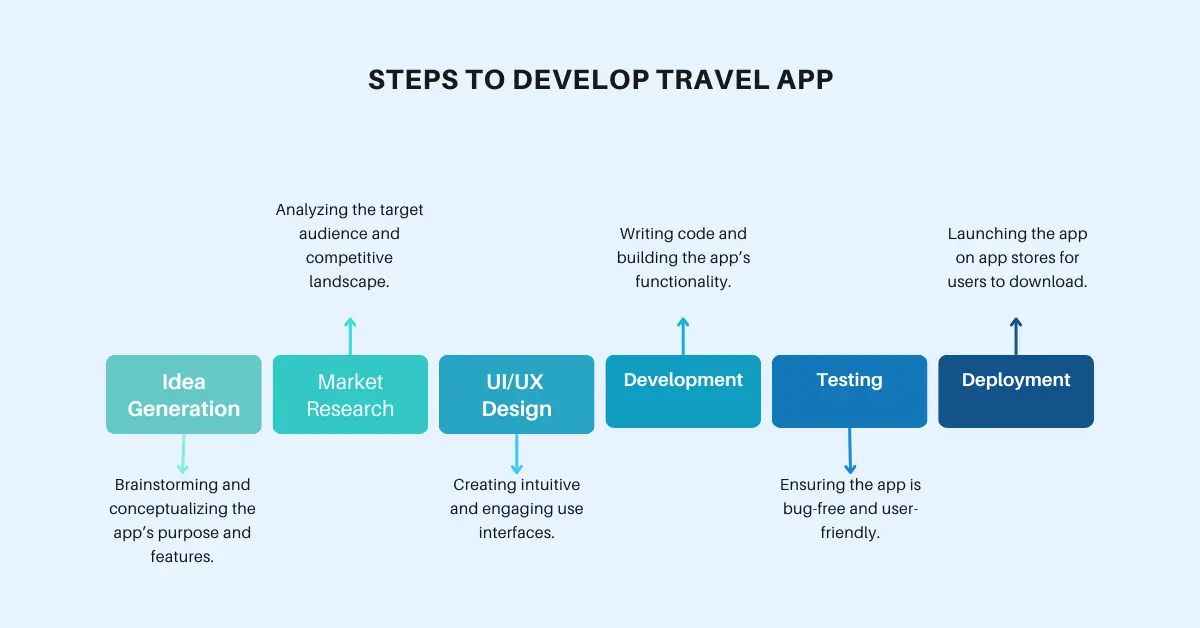
Now that we’ve covered the importance, types, and importance of creating a mobile app for travel agents, tour operators, agencies, and businesses, let’s get started with the process.
Define Your Target Audience
The first step to creating a mobile app for travelers, figuring out the target audience is a must. You must get a proper understanding of the region, types of customers, required services, and scale of the operations. These objectives will help you define the scope of your project and the budget required to develop a travel application.
Conduct Market Research
Once you’ve set the goal of your business, take your time to research the existing players in the market. This step will help you get a gist of the market gap that you can fill with your travel agency app for iPhone and Android. Competitor analysis will also help you avoid common mistakes and implement better strategies that bring profits sooner.
Plan UI/UX with Intuitive Design and Navigation
Once you’ve started with app development, meticulously plan the UI/UX of the application in such a manner that it complements your services and boosts the overall customer experience. While you’re at it, try to implement smoother navigation animations so that users of all ages can consume the travel services from your app without any hassle.
Hire a Travel App Development Company or Build In-house
Once all the factors are finalized, it’s time to get started with mobile app development. If you’ve got access to a team of developers, then the best choice is to build in-house. However, not many businesses are equipped with such a talented team. Travel app development companies can provide you with a personalized and scalable solution.
Develop & Test
After your mobile app for travel agency is developed successfully, take it for a spin. Remember, to create a mobile app for a website, you must be open to making changes during testing. Rigorously develop and test your application with the help of the QA team to make an efficient travel solution for your customers.
Choose the Right App Development Platform
Now this is the step where your research will start paying off. If you have analyzed your target and regions carefully, it’ll be easier to decide what platform is ideal for mobile app development. If you’re going for the USA and Europe user base, iOS app development is the best choice. However, Android app development is more suited for customers in Asia and South America. You can also go for both options if you’re after a diverse market.
Select Monetization Models
The ultimate goal of creating a mobile app for travel needs is to make money, right? Figuring out this aspect will save you a lot of time during app development. Consider all available options like Ads, commissions, featured listings, affiliate marketing, in-app purchases, and much more. This will help you in determining the best factor that will make you the most money.
Integrate APIs
The next step is to make your enrich your travel agency’s mobile app with real-time data, pricing information, and program it to provide instant booking confirmation. All this can be streamlined with a single GDS API integration process. Choose from the major providers like Amadeus, Sabre, or Travelport and enjoy real-time access to flight, hotel, maps, reviews, etc.
Launch, Promote, & Collect Feedback
And just like that, you’ll have a ready-to-launch travel agency app at your disposal. From now on, start working on all the promotion strategies to spread the word as far as possible. You can even consider releasing the beta version to the public and collecting feedback to further improve the app’s performance.
Update Regularly & Add New Features
After you’ve launched the mobile app for business, another set of responsibilities comes into the picture. Get your team to regularly work on app updates and provide new features to further improve the overall experience. If this works out, you can even create a unified solution that takes care of all the traveller’s needs in one place.
7 Must-Have Features in a Mobile App for Travel Agencies
When getting started with developing a mobile app for travel services, here are the features you must include for the betterment of both business and customers.
1. Simple Login and Onboarding
It’s not worth it to get crafty at the login page itself. Some users may find it annoying and may not even sign up at all. Try to keep it simple for new users to get started with your travel app. This simple login or onboarding page reflects simplicity and the ability of the app to serve customers of all ages conveniently.
2. Advanced Search & Filtering
Manually looking for a particular flight, cruise, or car rental option can be exhausting for customers. You can simplify this process by adding a quick filter option that enables users to pick their preferred categories and quickly find the service they are looking for. This can come in very handy, especially when you’re scaling your company and integrating more modules.
3. Secure Multi-Payment Gateway
A secure multi-payment gateway for a travel application ensures safe and reliable online transactions by allowing customers to pay using various methods while protecting sensitive financial information. This is achieved through encryption, secure protocols, and integration with trusted payment processors.
4. Real-Time Booking Confirmations
By opting to integrate popular GDS APIs in your travel application, you can enrich users with amazing features. One of them is instant booking confirmations. With this simple feature, you can empower transparency and prevent customers from sitting in the dark waiting for confirmation.
5. Travel Itinerary Builder
You can create a mobile app that not only helps customers to quickly book a service but also aids them in planning the best itinerary for their trip. By suggesting the best flight options, hotels, and activities to try for a particular destination, you can help customers enjoy their trip to the fullest without depending on third-party agents.
6. In-App Support/Chat
Manually catering to all customer queries can be exhausting for the support team. However, thanks to the latest advancements, taking care of existing users has become very easy. With AI-powered chatbots and virtual assistants, you can cater to customer queries with instant and accurate answers.
7. Multi-Language and Multi-Currency Support
In order to make your travel app scalable, you should provide it with features that help international customers use the platform without any hassle. By making the app multilingual, users can use it in their preferred language. In addition, multi-currency support lets customers pay through whatever means they want, like cards, net banking, wallets, etc.

Admin Panel Capabilities
Since you’ve the power to customize your travel application as desired, why not use it to streamline operations and perfect it for your business as well? Here are a few features that will help you maximize your business potential efficiently.
Booking Management System
By utilizing a booking management system, you can efficiently manage reservations, track bookings, and handle various aspects of travel management from one unified dashboard. These systems typically offer features like online booking engines, real-time inventory management, and integrated payment processing.
Dashboard with Analytics
Another feature that can help you indefinitely is the analytics dashboard. There is no denying how important insights are regarding decision-making or strategizing. When you have a dashboard like that, you can assess the live performance of your platform or a campaign to see if it’s working.
User Management
As your customer base grows, managing users can be hectic. However, with a strong authentication management system, you can authorize all users and have better control over how customers interact with your application.
Promotions and Deals Control
Another necessary admin panel feature that comes in handy is a quick dashboard to manage all ongoing promotions, discounts, deals, and offers in your custom travel agency mobile application. This feature will allow you to add or remove the promotions as per your liking and upcoming trends.
Feedback Monitoring
Mobile travel app development is a continuous process. Simply put, you must prepare your development team in-house or hired agency to make necessary improvements whenever necessary. The best practice for this is to collect feedback from customers on a regular basis. This way, you can update your application as per people’s liking.
8 Challenges in Travel App Development & How to Overcome Them
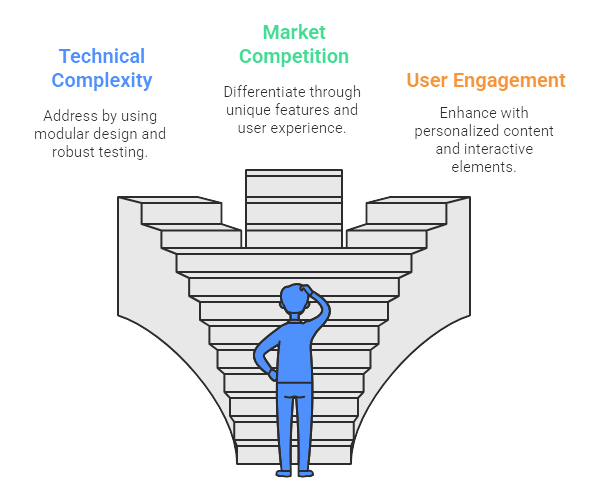
To create a mobile app for your travel agency, it’s better to consider challenges that can possibly hinder your workflow and be prepared with an effective countermeasure. Let’s discuss some of the most common challenges with their possible solution.
1. Real-Time Data Syncing
- Challenge: Ensuring up-to-the-minute availability for flights, hotels, or transport through external APIs or booking engines.
- Solution: Use robust third-party APIs, real-time data caching, and load balancing systems for uninterrupted syncing.
2. Language and Localization
- Challenge: Global users expect content in their language, with local currencies, units, and preferences.
- Solution: Implement multi-language support and geo-targeting features using tools like Firebase Localization or crowd-sourced translation.
3. High User Expectations for Speed & Accuracy
- Challenge: Delays in search results, bookings, or confirmations can result in poor reviews or app abandonment.
- Solution: Optimize API performance, utilize lightweight frameworks, and implement predictive caching with AI.
4. Data Privacy and GDPR Compliance
- Challenge: Collecting sensitive user data requires strict adherence to regulations like GDPR or CCPA.
- Solution: Apply end-to-end encryption, give users control over data sharing, and maintain GDPR compliance audits.
5. Offline Functionality
- Challenge: Users may lose connectivity during travel, limiting app usability.
- Solution: Provide offline access to itineraries, maps, and boarding passes with local caching and sync-on-restore logic.
6. Integration with Multiple APIs
- Challenge: Dependence on various APIs (for bookings, payments, weather, etc.) can introduce complexity and failure points.
- Solution: Use modular API architecture, monitor API health, and implement fallback protocols for critical services.
7. Cross-Platform Compatibility
- Challenge: Inconsistent experiences between iOS and Android devices can lead to user dissatisfaction.
- Solution: Utilize frameworks like Flutter or React Native for uniform design and functionality across platforms.
8. Maintaining Engagement During Off-Season
- Challenge: Travel apps may experience seasonal drops in user activity.
- Solution: Introduce loyalty rewards, send curated content, and run seasonal promotions to maintain engagement year-round.
Why Choose OneClick for Travel App Development?
Below are a few reasons why you should partner up with OneClick for your travel app development needs and streamline your operations for the better.
- Experience: With more than 12 years of experience in serving the travel industry and a team of 200+ dedicated developers, we can bring your ideas into a reality.
- Expertise: Our trained experts can hook your travel agency mobile application with multiple modules, popular GDS API integrations, and services as desired.
- Cross-Platform Development: We can cater to your needs regardless of the preferred platform, both iOS and Android.
- 24/7 Support: Get post-launch support at any time, whether you want to address an issue or are just looking for a new upgrade, we’re here for you.
- Secure: All the solutions developed by OneClick are compliant with industry regulations like CCPA, GDPR, and PCI-DSS.

Building a Travel App That Takes Your Agency Further
By carefully following the guidelines discussed in this blog, you can create a travel app that can revolutionize the way travelers interact and explore. Start small, iterate fast, and prioritize features that align with global trends and local needs. Additionally, OneClick is here to further complement your travel services and help you take it to the next level with our expertise.
FAQs
With OneClick, you can. Our experts will first help you understand your requirements and then hook you up with our capable developers who will bring your ideas to life.
In today’s digital age, the best tactics to market a new travel app are actionable digital Marketing strategies and social media engagement. You can further focus on user-generated content and influencer collaborations for better results.
All the travel solutions developed by OneClick are encrypted with AES 256 encryption and equipped with secure payment gateways to protect user data and payment information.
Yes, we provide mobile-responsive travel agency solutions that work flawlessly on every device without affecting the overall efficiency of the solution.
If you’re focusing on clientele from regions like North America and Europe, then it’s better to opt for iOS app development. However, for South America, Asia or Africa, it’s better to go with Android first.



